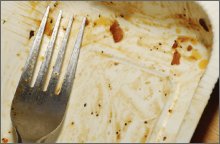The 8 Top Dietary Mistakes Healthy Eaters Make
by www.SixWise.com
Most Americans, 76 percent in fact, believe they have healthy
eating habits, according to a 2004 poll by Ipsos-Insight.
Yet 57 percent of the nearly 4,000 adults polled also considered
themselves overweight. How can this be? Either the healthy
eaters aren't being active enough, or we all have different
definitions of "healthy eating."
"People say they have a healthy diet, but what does
that mean to them?" said Ruth Kava of the American Council
of Science and Health. "Does it mean they eat an apple
a day and the rest of the day eat burgers and french fries?"
|

Too much fruit juice can leave your diet sugar- and
calorie-heavy.
|
As the poll showed, many people -- most of them, at that
-- believe they are healthy eaters. Meanwhile, a large portion
of this same group is struggling with their weight and feeling
tired and not in the best of moods -- hardly signs that they're
truly eating healthy.
Everyone, even "healthy" eaters, make mistakes.
Here are the biggest dietary mistakes that people make (and
still think they're eating healthy).
1. Not eating breakfast (or other meals).
Breakfast is the most important meal of the day, as your body
is literally breaking the "fast" you were in overnight.
Your body needs nutrients in the morning to get going -- and
not giving them to it will leave you famished (and prone to
overeating or binging on junk food) come lunchtime.
The same goes for skipping other meals -- you're likely to
be so hungry that you'll eat everything you can get your hands
on when you come home from work.
2. Drinking lots of fruit juice.
Fruit juice does have some vitamins, however, it also has
a lot of sugar and a lot of extra calories. Some of the lower
quality brands also contain artificial colors and flavors
and added sugar. The healthier choice? Skip the juice and
grab a piece of fruit instead.
"What freaks me out is the amount of sugared soda and
juice we drink," says Judith Stern, ScD, RD, professor
of nutrition and internal medicine at the University of California,
Davis. "I'd like to see all the sugared drinks sent out
into space, where they could orbit the Earth forever."
3. Eating too many "healthy" snacks.
Snacking is fine -- healthy, even, if you're eating fruits,
veggies and other nutrient-dense foods. But watch out for
those not-so-healthy
"health" foods like pretzels, fat-free chips
and cookies, and giant bagels.
It's a lot easier than you think to add an extra 500 calories
to your daily intake just by grabbing a handful of this and
a handful of that throughout your day.
4. Drinking diet sodas all day.
Many people think that switching from regular to diet soda
is a healthy choice. True, you are getting fewer calories
and sugar, but diet soda is not good for you. Rather than
putting a bunch of artificial sweeteners, flavors and colors
(not to mention the caffeine) into your body, you're much
better off with plain water or herbal tea.
5. Overloading the pasta.
Pasta got a bad rap during the "low-carb" craze,
but there's still a large group of people who swear by it.
Pasta, particularly the kind made from whole grains (not refined
white flour), can be part of a healthy diet. The trick is
to eat it in moderation, as the carbs can raise your blood
sugar and lead to a surge of insulin in your body otherwise.
The problem is that people often eat up to four cups of pasta
at one sitting, when an average serving size is just one cup.
6. Eating a lot of energy bars and drinking sport's drinks.
Energy bars, though marketed as health foods, are often little
more than over-priced candy bars. Some do have added nutrients,
but most also have some form of sugar and a lot of calories.
Sport's drinks, similarly, are often loaded with sugar (and
artificial flavors and colors) and -- unless you're literally
running marathons -- you probably don't need those extra calories.
7. Cutting out all fat from your diet.
All fat is not your enemy. In fact, fat is vital for your
body to function properly (or at all). The important thing
is to know which fats are healthy and which are not. Fats
to definitely avoid include trans
fats (found in commercial baked goods, margarine, doughnuts,
French fries and other snack foods). The experts are split
when it comes to saturated fats, with some saying they should
be avoided and others believing they are actually quite healthy.
|

Even "healthy" frozen dinners can leave you
devoid of important nutrients like fiber and antioxidants.
|
Most everyone agrees that monounsaturated fats, the kind
found in avocados, olive oil, and nuts,
and omega-3 fats, the kind found in fish, are exceptionally
healthy and should definitely be included in your diet.
"If you keep track of total calories, you don't have
to worry about how much fat you eat, just what kind,"
said Alice Lichtenstein, DSc, an American Heart Association
spokesperson.
8. Focusing your diet on frozen "healthy" dinners.
These meals may give you some vegetables and protein, and
certain varieties will help you to stay trim by limiting your
portion size (if that's all you eat), but they are not especially
healthy. Many are lacking nutrients and contain preservatives
and other unsavory ingredients.
Further, "Eating too many heavily processed foods can
leave you short on fiber and antioxidants such as vitamin
C," explains Jo Ann Hattner, RD, clinical dietitian at
Stanford University Medical Center.
A healthier option would be to spend a day over the weekend
cooking large batches of your favorite meals, then freezing
them in convenient portion-sized containers. This way, you'll
have a truly healthy meal that you can grab from the freezer
and heat up after work.
Recommended Reading
The
World's 8 Most Deceptive Foods: We Think They're Healthy,
but Should Think Again
8
Secret Tactics that Trigger Your Body to Burn More Fat and
Calories
Sources
CBS
News: Healthy Eaters Say They're Hefty
Prevention:
Busted! 5 Major Eating Mistakes